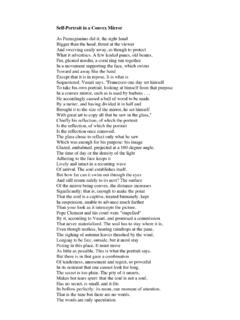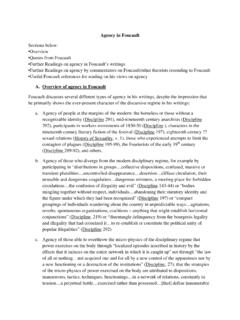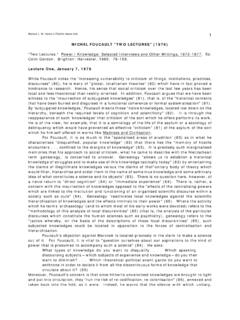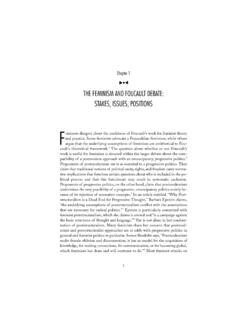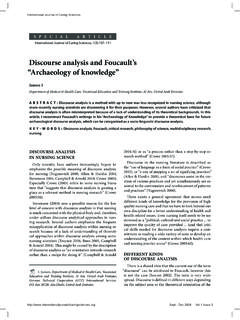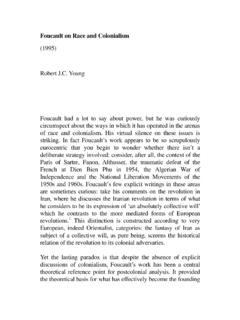Transcription of Foucault and the Genealogy of Pastoral Power
1 Electronic copy available at: significant concepts of the modern theory of the state are secularized theological concepts not only because of their historical development in which they were transferred from theology to the theory of the state, whereby, for example, the omnipotent God became the omnipotent lawgiver but also because of their systematic structure, the recognition of which is necessary for a sociological consideration of these concepts. Carl Schmitt, Political Theology Every year, from his election to the position of Professor of the Coll ge de France in 1970 until 1982, Michel Foucault delivered a course of lectures open to the general public (with the exception of a 1977 sabbatical). The express intention of these lecture courses was for Coll ge Professors to report on the progress of their current research projects. As a result, the published lecture courses exhibit a certain experimental, pleasingly unfinished quality; what we read is Foucault submitting to a room of budding acolytes the tentative conclusions and seductive hypotheses of Foucault and the Genealogy of Pastoral Power Ben Golder Radical Philosophy Review volume 10, number 2 (2007) 157 176 Review of: Michel Foucault .
2 Security, Territory, Population: Lectures at the Coll ge de France, 1977 1978. Trans. Graham Burchell. New York & Basingstoke: Palgrave Macmillan, 2007. Pp. 384. Hardcover, $ ISBN: copy available at: Golder 158 a work in progress. There are thus, as one commentator on the lectures observes, references to current world events, to books that have recently come into print, and even to headlines from the morning s newspaper. 1 The full series of lecture courses given by Foucault spans the seeming decline of his archaeological method in the early 1970s, the development of his better-known genealogical investigations in the middle to late 1970s, and finally his interrogation into the 1980s of the constitution of subjectivity via the texts of ancient antiquity and early Christianity. Putting aside for a moment certain ethical considerations pertaining to the use of this serendipitous Nachlass,2 the lecture courses evidently constitute an invaluable resource for Foucault scholars.
3 They are interesting and useful not simply for their immediacy and the breadth of their combined coverage, but also for the fact that they allow us to map and to explain shifts in Foucault s theoretical positions and methodologies in the putative silence between his published monographs. Frequently they supplement and contextualize some of the better-known formulations which appear in the books, lectures and interviews; and, more interestingly, in places they present examples of Foucault revising or contradicting some of the views expressed in his published As a result, those lecture courses which have now been published have generated significant academic interest indeed, one recently published monograph on Foucault takes the lecture courses as a point of departure and deploys them as a means to re-interpret Foucault s To date, five lecture courses have been translated from French into English: Abnormal (1974 75), Society Must be Defended (1975 76), The Hermeneutics of the Subject (1981 82), Psychiatric Power (1973 74), and most recently Security, Territory, Population (1977 78).
4 My consideration of this last and very welcome addition to Foucault s post-humously expanding oeuvre proceeds in two parts. In the first, I offer a summary 1. Eric Paras, Foucault : Beyond Power and Knowledge (New York: Other Press, 2006), p. 2. 2. For an interesting discussion of the theoretical issues surrounding the use of the lecture courses for Foucault scholarship, see Brad Elliott Stone, Defending Society from the Abnormal: The Archaeology of Bio- Power , Foucault Studies 1 (2004), pp. 77 79, [accessed January 29, 2007]. 3. Perhaps the best known example of such profitable disjunctions between the monographs and the lecture courses is the way in which, in the final lecture of the course for 1975 76, Foucault discusses the centrality of state racism to the operation of bio- Power , while this foregrounding of racism is noticeably absent from the final chapter of The History of Sexuality, Vol. 1, which deals with very similar material.
5 Compare Michel Foucault , Society Must Be Defended : Lectures at the Coll ge de France, 1975 76, trans. David Macey (London: Allen Lane, 2003), pp. 239 64, with Michel Foucault , The Will to Knowledge: The History of Sexuality, Vol 1, trans. Robert Hurley (New York: Random House, 1978), pp. 135 59. On racism and bio- Power more generally, see the special issue of Radical Philosophy Review 7, no. 1 (2004) devoted to the theme of Biopolitics and Racism. 4. Paras, Foucault , p. and the Genealogy of Pastoral Power 159 and exegesis of Foucault s arguments in Security, Territory, Population. In so doing, I aim to contextualize central themes of the lecture course by relating them to approaches taken up and jettisoned in succeeding work, and by linking them to the general trajectory of Foucault s thought as a whole (as given expression in his published writings). In the second, I propose an interpretation of the lecture course, a reading of the course as a contribution to the critique of the theological basis of modern state Power .
6 I argue that this genealogical discussion of the historical development of the Christian pastorate and its gradual assimilation into modern state apparatuses constitutes a peculiarly Foucaultian approach to the problematic of the state, both because it takes as its primary focus the technologies and modali-ties of Power (first developed in a Christian context) and because, in the course of so doing, Foucault foregrounds the possibilities of resistance to, and within, this Pastoral -cum- secular modality of state Power . I. The Lecture Course for 1977 78 Situating the CourseThe thirteen lectures given by Foucault for the academic year of 1977 78 ran from January 11, 1978 until April 5, 1978. In terms of the chronology of his annual courses at the Coll ge de France, Security, Territory, Population (hereafter, STP ) thus falls between Society Must be Defended and The Birth of Biopolitics (published in French in 2004 and to be released in English shortly).
7 Society Must be Defended proposed a Genealogy of the emergence of what Foucault termed the first historico-political discourse on society. 5 This discourse, found in England in the writings of thinkers such as Coke or Lilburne, and in France in the work of the aristocratic historian Henri de Boullainvilliers, utilized the concept of war as a grid of intelligibility for Power relations in society. In Society Must be Defended , Foucault traced the development of this discourse, with its various deployments and reworkings, up through the twentieth century to the emergence of a discourse of biologized state racism. Particularly in its concluding discussion of bio- Power , there is noticeable overlap with several central concerns from The History of Sexuality, Vol. 1, and we can see Foucault in this period moving beyond the analysis of social relations in terms of institutional mechanisms of discipline to a wider, or more macrosocial, analysis of bio- Power .
8 The thematic of bio- Power is of course taken up in STP, although as we shall see it is very quickly subordinated to the more precise investigation of governmentality and apparatuses of security. This downgrading of the explicit theme of the bio-5. Foucault , Society Must be Defended , p. Golder 160 political is again practiced in the lecture course immediately postdating STP. In The Birth of Biopolitics, Foucault moves beyond the titular concern with bio-politics to the real subject of the lecture course, liberalism, understood in genealogical terms neither as a theory nor as an ideology, but rather as a practice, or as what Foucault might term a political technology (he looks specifically at two variants of twentieth-century liberal thought: German Ordo-liberalism and the Chicago school of neo-liberal economics).6 STP is thus located at that point in Foucault s researches where, having taken up the theme of bio-politics as a means of extending his earlier analyses of discipline (and there are several revisionary comments in STP to the effect that the concept of discipline does not suffice to explain Power s operation in modernity), he yet realizes that the notion needs supplementing and reworking first in the direction of governmentality and apparatuses of security, and then later of liberalism as a political technology.
9 Indeed, one of the things which arises from a reading of STP is the fact that, despite its popularization by contemporary writers such as Giorgio Agamben,7 the theme of bio-politics or the bio-political is really not developed as a stand-alone notion at any great length by may also be situated in relation to some of Foucault s better known books of this period, coming between the publication of the first volume of the History of Sexuality project (in 1976) and the somewhat delayed publication of the theoretically reformulated second and third volumes of the series (both published in 1984). The lectures are thus delivered at the beginning of one of those commonly remarked monographic silences (a somewhat loquacious silence, it must be observed, which is punctuated by manifold lectures, interviews and journalistic interventions) wherein Foucault , as Beatrice Han notes, seems to have abandoned, or reexamined 6. For the non-French reader, an account of the lecture course can be found in Colin Gordon, Governmental Rationality: An Introduction, in The Foucault Effect: Studies in Gov-ernmentality, ed.
10 Graham Burchell, Colin Gordon and Peter Miller (Chicago: University of Chicago Press, 1991), pp. 1 51, and in Foucault s translated course summary, Michel Foucault , The Birth of Biopolitics, in Essential Works of Foucault 1954 1984, Vol 1: Ethics, Subjectivity and Truth, ed. Paul Rabinow (Harmondsworth: Allen Lane/Penguin, 1997), pp. 73 79. 7. Suffice it to say that Agamben s deployment of the concept differs markedly from Foucault s. See Giorgio Agamben, Homo Sacer: Sovereign Power and Bare Life, trans. Daniel Heller-Roazen (Stanford: Stanford University Press, 1998), especially pp. 3 6, 9, 20, 87, 111, 119 21, 187. 8. While Foucault explicitly discusses bio- Power in the final chapter and lecture of, respectively, The History of Sexuality, Vol. 1 and Society Must be Defended , as well as in some lectures and interviews at this time, he nevertheless does not fully thematize it. I would argue that this is because the concept is a relatively broad and amorphous one, and that (contra Timothy O Leary, who argues that bio- Power is conceptually.)
